#i have so many feelings apparently
Explore tagged Tumblr posts
Text
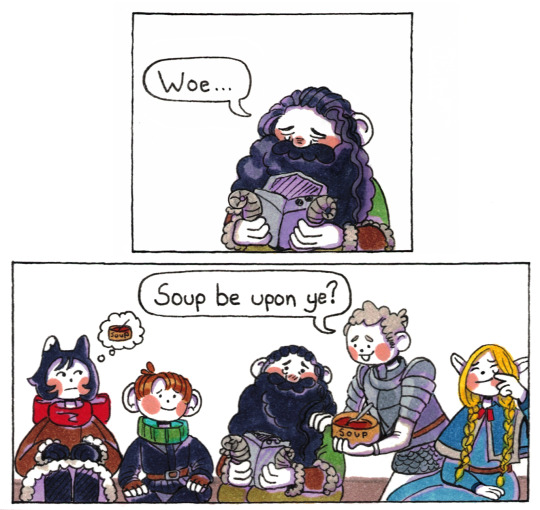
Soup solves everything.
#dungeon meshi#dungeon meshi spoilers#Senshi#izutsumi#chilchuck tims#laios touden#marcille donato#THE SOUP CHAPTER HAS BEEN ANIMATED#I have so many thoughts about senshi's backstory and how much that experience has shaped who he is.#This is such a powerful moment because it makes it clear how *stuck* senshi has been because of his trauma.#Up until now he has been a mystery! He's the chef guy! Don't worry about his apparent reclusiveness from society!#Don't worry about his intense need to make sure 'the young ones are fed'!#Senshi still has a lot of healing but this was the moment he could finally forgive himself.#This chapter is so important to me because sometimes you truly do need to face the most terrifying things to move past them.#This joke here is a bit too narrow to be funny for the masses...but mdzs fans know.#MDZS :handshake: Dungeon Meshi: Soup moment.#Laios and Jiang Yanli have a powerful magic call "Eat some soup and maybe you'll feel better'#That is also a spell you can cast upon yourself. Go eat some soup and you will feel better. Merry Soupmas everyone.#One more week of Thistle Thursdays....I'm not ready to say goodbye B*(
5K notes
·
View notes
Text



i'm doing a bunch of drawings of the main 4 (sometimes also alluka) camping in lukso province like slightly post-canon.... these are the ones that didn't really require much emotional sincerity to make lol (the other ones are hopefully gonna get finished later)
#leopika#killugon#gon freecss#killua zoldyck#kurapika#leorio paladiknight#alluka zoldyck#ftm kurapika#hxh#art#it feels SO weird putting this many tags on something. self conscious. not used to having more than like 2 different guys in one thing#i Will draw kurapika having some sort of complex emotions here but first. gotta draw him kissin' apparently#the Cool Rock was meant to be an opalized ammonite with quartz growing on it. but i never drew it big enough to make it look actually cool#ah.... i made leorio's sleeves not rolled up in one panel... pounding my fists on the floor
1K notes
·
View notes
Note
Hi it's just to let you know that the official romanization of Revaan's name is Raverne ! Also they have romanized Baul's name to Baur !
Twst coming back at us again with the least expected romanization! thank you everybody (oh god my inbox) (no it's great, I literally asked for this and the reactions have been INCREDIBLE, thank you all!)
I do like Raverne though, I think it's got a nice fancy sound to it! (I had kinda suspected it was going to be an R instead of an L, so the fact that it's SO close to Laverne except for that is hilarious to me personally.) and Dragoneye Duke is honestly probably the best translation for his title, I wasn't envying the localizers that one. :') Baur instead of Baul I was NOT expecting, but in retrospect I think his name's supposed to be a reference to the Bauru crocodile, so that actually makes way more sense!
someone else also said Meleanor has become Maleanor, which is the REALLY weird one to me, because I was so surprised it was written as Mel instead of Mal in the first place?! oh god no I can't decide which one I like better. 😭 (I wonder if they might change it to Mal...they have made romanization changes before) (like I remember House of Distraction being corrected to House of Destruction in Playful Land) (I did check and she's still Mel for now, but I dunno, they might Mal her up and some point and save me from having to make a decision about which one to use) (HECK I CAN'T DECIDE)
uhhhh thank you for letting me ramble about anime names, let's just say MONOGRAMMED SWEATERS FOR EVERYONE
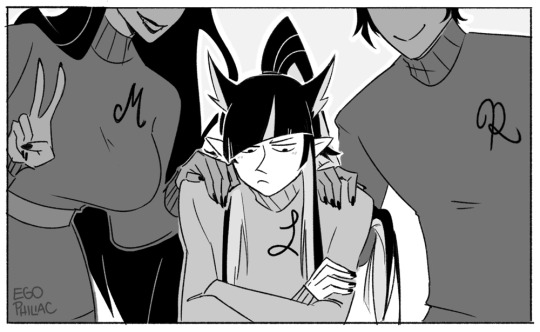
#twisted wonderland#twisted wonderland spoilers#twisted wonderland episode 7 spoilers#twisted wonderland book 7 spoilers#twisted wonderland episode 7 part 4 spoilers#twisted wonderland book 7 part 4 spoilers#mel is so cute but mal fits with the rest of the draconias better#eng version no you were supposed to save me not make things MORE confusing#anyway raverne huh#that uh. that sure feels like it's supposed to evoke raven doesn't it.#what does it mean WHAT DOES IT MEAN#hold on i'm going to flail around embarrassingly about anime character theories now#(okay first a disclaimer: i do think we need to sit down as a fandom at some point)#(and have a discussion about exactly what is actual canon versus meta speculation versus jokes)#(because i think there has been. some confusion. over that re:crowley and raverne specifically)#(but i do feel justified in being like THEY ARE PROBABLY CONNECTED SOMEHOW RIGHT?! right now)#like i really don't think it's as simple as crowley being raverne but with memory loss or something#(and if they pull that on us i'm going to need an EXTREMELY good explanation to go with it to justify that)#they've gone out of their way several times now to make a point about them acting and sounding different and it feels very intentional to m#(and once again: i super 100% absolutely do not believe that lilia wouldn't recognize him with the top half of his face covered)#i just think the contradictions are a lot stronger than the connections right now but there ARE some connections and i'm 👀ing at them#to be fair the connections are mostly meta like crowley being diablo/raverne being evocative of raven#also the general 'raverne mysteriously disappeared and apparently had distinctive eyes' thing#versus 'crowley's past is unknown and he never shows his eyes'#(i will argue that crowley DOES seem to have some kind of canon connection to briar valley)#(since he is clearly some sort of fae and the masks are a briar valley thing)#and that is kinda it right now isn't it#okay hold on i had to delete some tags because i used too many (thanks tumblr for letting me know and not just vanishing them OH WAIT)#so tl;dr: i'm in the 'crowley is connected to raverne somehow but it's more complicated than just him being in disguise' camp personally#but that will probably change as we get more info and also don't take this as an anti-speculation thing because i love theories HOORAY
2K notes
·
View notes
Text
He eepy . .
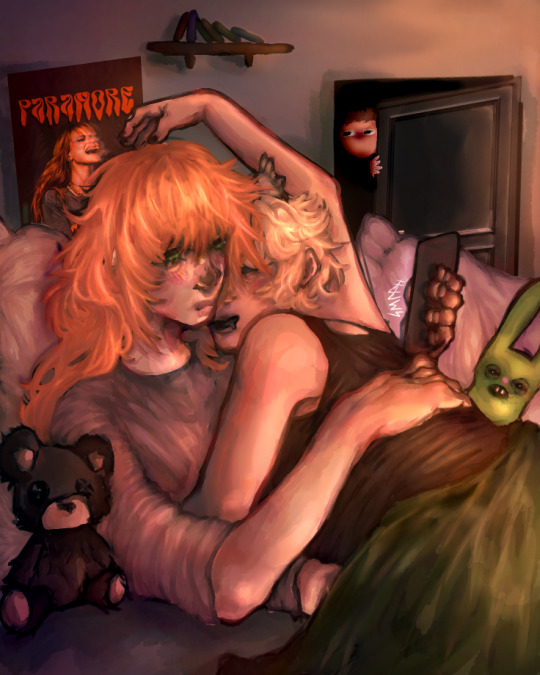
But seriously , he’s a heavy napper
someone help her
pls
#This is the biggest thing I ever done for a fandom lmao#I low key hate it#it looks so crusty#Can I share my art headcanons with everyone again please#I know I said Aiden was a good artist like 2 other times but pls plsplsplspls i wanna do everyone#Ew he’s drooling#Silly boy#headcanon he’s a light sleeper but heavy napper I’m pretty sure I said that last time#school bus graveyard#sbg#sbg (webtoon)#school bus graveyard webtoon#aiden clark#ashlyn banner#Aidlyn#ashden#art#i have so many songs that I feel fit him#I’m drawing ashlyn with a low taper fade now apparently#These tags aren’t even related to the post#Also yes that’s Ashlyn’s dad in the background lmao#Aiden is like a weighted blanket tho dont worry
983 notes
·
View notes
Text
Actual Ultimate Classpecting Guide
For real this time.
Buckle up, this is a really long one. For everything that's posited, I can provide textual evidence; that being said, I'm not going to be including the textual evidence within the essay itself, because it's already long enough as-is. As such, please feel free to ask for clarification or sources on any assertion, and I'll do my best to provide.
Before we begin, there's some things to discuss about how we're going to be approaching classpect in the following essay. In numbered list form for our short attention spans:
1. There is a concept Hussie talks about multiple times in his book commentary, "personality alchemy" - the idea that there are these "platonic ideals" of certain characters, which can be mixed and matched with others, in order to create new characters. The examples he gives are of how Eridan was a proto-Caliborn, how Kanaya has shades of Jade, how Nepeta was a proto-Calliope, and how Sollux and Eridan have shades of Dave in them. Classpecting is fundamentally a form of this personality alchemy:
2. Class describes the character's arc and emotional hurdles, while Aspect describes the character's base personality traits by which this arc is experienced.
3. For example, all three Seers struggle with hubris: Rose's need to be the smartest person in the room led to her being manipulated by Doc Scratch, Terezi's obsession with meting justice led to her engineering a situation where the only option was to kill Vriska, and Kankri's desire to be seen as a spiritual leader amongst his friends led to him furthering their divisions and harming them.
Then, when their pride is shattered, they cope by inflicting willful self-blindness: Rose turns to drinking herself stupid (the opposite of Light's sway over knowledge), Terezi gets down with the clown (the opposite of meting out Mind's justice, as it's a Gamzee W), Kankri goes celibate (Blood L) despite his clear romantic feelings for certain teammates.
4. As for Aspect: note how all three Life players share the personality traits of optimism, stubbornness, and obstinacy. All three Breath players share an immaturity and naïvety, and are quite frankly irresistible to people for some reason. All three Light players share a need for the spotlight and a tendency toward long-windedness and persnicketiness. So on and so forth.
What's interesting is, if you start analyzing characters that share Classes and Aspects, these specific types of similarity crop up over and over - all our Knights struggle with insecurities and facades, both our Bards have a crisis of faith. All three Breath players have an aspect of immaturity and childishness to their characters, and all three Light players are deeply concerned with appearing intelligent and feeling important.
5. As a result, this guide is NOT intended for classpecting real life people, because we are complicated, we contain multitudes, and we don't have arcs. This is primarily an analysis of what Class and Aspect mean in Homestuck based on textual evidence, because I genuinely believe that you can basically figure it out if you read carefully.
6. Duality, and the idea of "equal and opposite," are major themes within Homestuck - Prospit and Derse, Skaia (described as a crucible of birth and creativity) and the Furthest Ring (the literal afterlife). Which classes are involved in an Active/Passive split, and opposing Aspects, are the same way. This is the primary method I used to determine the Active/Passive pairings and opposing Aspects. After all, as Callie describes, both Thieves and Rogues are classes "who steal" - so, too, do I try to unify Classes by a common theme, even if they diverge wildly in how that theme is expressed (as Thieves and Rogues do). In the same way as the opposite of "up" is not "apple," but "down", because "up" and "down" are both fundamentally concerned with relative vertical position, so too can be defined concepts like Breath and Blood, Hope and Rage, Light and Void - as well as the reasoning behind Class pairings like Heir and Page, Maid and Knight, and Seer and Mage.
7. Descriptions for both Class and Aspect are left deliberately vague and up to interpretation within the comic itself, and this is by design: the actual manifestations of an Aspect can vary wildly given the Class, and even individual person, that it's tied to. Calliope even makes note of the fact that, under the right circumstances, someone can manifest effects that appear to be the opposite of their aspect. She's also careful to couch her language in "may" and "can" - because these concepts are intentionally somewhat nebulous and malleable. As such, while this guide certainly lays down what can be gleaned and inferred from the text, do note that Homestuck runs on a soft magic system, and as such, nothing stated is firm, 100%, must-always-be-this-way - just an overview of what we've seen.
8. There is often great overlap between Aspects, Classes, and Classpects - which Calliope herself notes. Heart and Blood are one of the most salient, as they both have a fixation on relationships, and Calliope mentions that under the right circumstances, a Classpect may even be able to manifest what appears to be the opposite of their Aspect. Again, Homestuck operates on a soft magic system, so this is a feature, not a bug.
ASPECT
There's a little less to say about Aspect, not because it's less complicated, but because "base personality traits" are much more nebulous compared to Class's sway over character arc. Still, Aspect represents the fundamental way a character is, and thus, color every interaction that character has. There's a reason Ultimate Selfhood is sought through Aspect, not Class - Aspect is the core of the character's being, what makes that person that person.
That all being said, Class has major sway over how an Aspect manifests, and certain classes can even invert the Aspect and even the character's role in the party. As such, these descriptions must be parsed carefully in relation to Class. Moreover, due to the soft magic system, there is at times overlap between unrelated Aspects, which can also be exacerbated by Class - Heart and Blood being the most obvious in this regard. Still, overall, you'll find the Aspects to be fairly distinct from one another.
Please also note that every Aspect can deal with its literal counterpart by default - Light players can wield lasers, Breath players can wield the breeze, et cetera. Because this kind of goes without saying, and because the non-literal stuff is more interesting to discuss, I'm not really going to go into too much detail about the literal qualities.
Finally, something interesting to note is that nearly every Aspect follows its own Hero's Journey cycle - full actualization for each one usually means reaching around to its opposite Aspect, and taking lessons from them - for example, Breath players need to learn maturity and responsibility, while Blood players need to learn relaxation and whimsy. Thus, an Aspect at its worst manifests in two ways - either a toxic overabundance of the Aspect's worst traits, or such a dearth of the aspect that it begins to resemble its opposite. Only by reaching into the opposite, however, can the player be tempered and reach full maturity - can they become more of who they are.
SPACE / TIME
Space and Time are both concerned with physical reality, goals, and the way one approaches them.
Space is associated with "the big picture" - with recycling, reproduction, and the interconnectivity of all things. The aspect also presides over the enjoyment of the journey over the destination - Space players serve as reminders that the present moment is as important as the end goal. Space is often a more passive Aspect, being the stage upon which the story is set. They're the hosts of the party, and the one who marks the ending.
Its players reflect these tendencies, often being feminine, with penchants for life-giving acts such as gardening. Their personalities tend towards frivolity and silliness, finding it difficult to stay on-topic or bring full gravitas to serious situations. Perhaps a better word would be "distractable;" when the aspect is so concerned with all things in connection with each other, it's easy to lose track of details, and it's easy to enjoy things simply as they come. Space players tend to be kind, patient, and forgiving, which is a strength as much as it is a flaw; it's easy for malicious actors to take advantage of this compassion, or for the Space player to find themselves in a poor situation by being overly permissive. They can easily be painted over by stronger personalities, and tend to struggle with romantic relationships, as they attract many with their kind and giving natures, and few are naturally so considerate of the Space player in turn.
"Passive" is a good word to use; at a toxic overabundance of their Aspect, Space players are trampled underfoot. They become enablers, servants to dark forces, or so lost in their own worlds that they neglect the one they live in. With their Aspect "inverted," a Space player becomes a demon of poor prioritization. Distracting not just themselves from their true purpose, but others, too, the Space player will wreak havoc by overemphasizing unimportant topics and ignoring important tasks. This superficially resembles Time, in that the Space player will become fanatically dedicated to their task, but note that the poor prioritization is still Space-esque at its core.
Still, within this nadir is a valuable lesson: the strength of self-assertion, and the determination to see a goal through. These will allow the Space player to weed their garden, separating good from bad, allowing it to flourish like never before.
Time, in contrast, is associated with "the little things" - with details, minutiae, and processes. Time presides over the struggle toward something greater, the endurance of hardship with an eye on the prize - the destination over the journey. Time players are the ones keeping track of the tasklist, marking off each item as it reaches completion; they are the tireless workers keeping the whole engine running.
Time players, thus, are ones whose lives are marked by struggle. They are highly goal-oriented; in contrast to how Space players can easily move from goal to goal, task to task, Time players feel bound to see things through to the end, finding satisfaction only when they've achieved their desired result - and only until they come across the next goal in their journey. A Time player isn't happy without a goal to work towards, a craft to polish, a prize to win - but this driven nature can easily be its own downfall, as it leaves little room for the player to admit to their own shortcomings, or ask for help from others. Moreover, their focus on minutiae can leave them blinded to the bigger picture, and it's easy for a time player to fall to despair, able to do nothing more but spin their wheels. They're prone to directionless anguish, frustration, and resentment towards the seeming futility of their actions, becoming destructive and defiant even when it doesn't serve them to do so.
At a toxic overabundance of their Aspect, Time players become explosively destructive. The ultimate "goal" of all things is death, with which Time is associated, and accordingly, Time players have a penchant for aligning themselves with futility and entropy, struggling so hard that their thrashing leaves a trail of annihilation in their wake. With their Aspect "inverted," Time players detach entirely - they can become so fed up with struggle that they simply opt to lay their weapons down and let the end take them. It's very easy for them to come to the conclusions that either everything matters, or nothing matters. This superficially resembles Space and its big picture thinking, but note that its framework of struggle, and whether or not a goal needs to be pursued, makes it a Time concern.
But the inherent meaninglessness of existence is, in itself, an important realization to make - that whether or not anything "matters" in the grand scheme, things can still be worth doing, worth caring about, and worth investing in. This realization allows the Time player to attack their goals with renewed vigor and greater clarity, which in turn means that the party becomes an efficient, well-oiled machine.
BREATH / BLOOD
Breath and Blood are both concerned with directionality, interpersonal relationships, and autonomy.
Breath is the Aspect governing freedom, liberty, and independence; it is a force that breaks shackles, clears out social norms, and refutes "the rules," whatever those rules may be. Breath players can't be tied down, whether by physical bonds, societal rules, or even the ineffable forces of the narrative itself. They are leaders of example, pioneers, and trailblazers, opening new paths for their teammates to follow.
Breath players are goofy and gullible, often with hearts full of childlike whimsy, naivety, and even immaturity. They are friendly and well-meaning, fond of simpler things, and easily swayed by others. They approach the world with a sincere and innocent good-naturedness, like a baby animal before it learns to be fearful of danger. Something about this sincerity seems to make Breath players irresistible to others, and they often find themselves the subject of romantic attraction. However, in this childishness is also the great pitfall of many Breath players - their natures are naturally conflict-averse, and egotistical the way a child can be, failing to see beyond themselves. They can be incredibly callous when not considering the consequences of their actions, or the viewpoints of others.
At their worst, Breath players are irresponsible and callous. They'll shirk the consequences of their actions, blaming anybody but themselves, or simply choose not to care who they hurt in order to get what they want. They may even choose to stop making choices for themselves, leading to the "inversion" of their Aspect - a voluntary loss of freedom and independence, derived from an Breath-like aversion to responsibility, which superficially resembles the bondage of Blood.
But if they are able to overcome these tendencies, a Breath player will learn what true responsibility looks like - responsibility for themselves, their choices, and the effect they have on others. Armed with this, a Breath player's ability to break bonds can be focused into a clear force for good, clearing away all obstacles and harmful societal standards, leading the charge into something new and beautiful.
Blood, in sharp contrast, is the aspect that governs bondage, contracts, and interdependence. It is a force that binds. Under Blood's sway are not only romantic entanglements, but familial, friendly, and societal ones as well. This aspect sees overlap with Heart, but the division is this: Heart concerns itself with feelings, and Blood concerns itself with compatibility. Blood players are diplomats, forces that remind us all that we are more similar than we are different, and that that similarity should bring us together when we are on the verge of pulling apart.
Blood players, reflective of their Aspect's association with bonds, tend to be neurotic and obsessive. They have a tendency to over-examine and overthink, constantly fretting over the infinite and infinitesimal variables that influence the shape of society and interpersonal relationships. However, this judgmental nature stems from a deep well of idealism and empathy; Blood players can't help but care about others and wish for the best for them. In a way, this makes them one of the most mature members of the team, being concerned with its overall well-being. Unfortunately, their prowess does not extend inwards, and their assessment of themselves is usually direly incorrect - all the worse because Blood players always feel responsible for those around them. Blood, being the Aspect concerned with interdependence, is the weakest one when all alone.
Thus, it's easy for the Blood player to wind up controlling - desperate to make sure everyone is moving according to their vision, they'll become iron-fisted dictators, with a "my way or the highway" approach to social interactions. It's easy for them to wind up pariahs of their own making, becoming so critical of others, or so adamant about enforcing their own will, that they inadvertantly sever their ties - something that superficially resembles Breath's independence, but is truly a result of Blood's neuroticism.
But with that space and separation can come great clarity. Blood players must learn to relax their grip, and allow people room to breathe - including themselves. Once able to grasp that sometimes bonds must be forged with a soft touch, Blood players' natural empathy shines through, allowing them to build something so much kinder and greater than the sum of its parts.
LIGHT / VOID
Light and Void are both concerned with knowledge, ontology, and "narrative relevance".
Light (as well as its counterpart) are perhaps best understood through the lens of "narrative" - this idea that, of all things that do and don't exist, and all events that do and don't happen, only the ones put to page are "relevant". Thus, Light is associated with knowledge and luck - that is to say, it's associated with the knowable, the objective, and the concrete, and the ability to determine "important" events. Light players have read the book they're participating in, and able to serve as luminary guides from one plot point to another, lighting the lampposts for others to follow.
Light players, naturally, are erudite and educated, possessing keen intellects and cunning minds. They are fond of knowledge itself, of markers of status and prestige - whether that's wealth, the adulation of the masses, or a massive library. They harbor a desire to be important, to be seen, to be acknowledged, and are happiest when they are looked up to. Conversely, they deal poorly with being looked down upon. Their confidence transmutes easily into hubris, and they struggle with having that pride challenged. As such, they tend to be volatile and unpredictable, quick to retaliate against those who threaten their egos, or obsequious to those whose acknowledgement they desire.
Their desire for the limelight can quickly spell disaster - they can become incredibly cruel, harsh, and egotistical in their pursuit of narrative significance. They forget, in their obsession, that they, too, are fallible and flawed, and the inevitable reminder can come very harshly. Light players struggle with moderation, and as such, when they feel shame, they'll often take drastic measures to cope with it - deliberately darkening their own influence or intellects, removing themselves from the "story" entirely - something which superficially resembles Void's penchant for the background, but which is firmly rooted in Light's obsessive need for drama.
But in experimenting with narrative insignificance, Light players can reach an epiphany - in their absence, others may shine, and that can be a wonderful thing. Light players, then, can learn to shine not just for their own sakes, but for the sake of others, allowing them to weave a story even more brilliant than any that can be weaved alone.
Void, in contrast, is the blank spaces between the words. That which is secret, subjective, unknowable - these are Void's domain. It's associated with taboos and hidden things, sexuality and pleasure. It's also associated with the empty canvas - the blank space before creation, and the oblivion to which creation is eventually destined for. Thus, it stands for infinite possibility, though the collapse of those possibilities into a reality removes that reality from Void's domain.
Thus are Void players ever cosigned to the background, though this generally suits them fine. Void players are very self-possessed. Where Light players tend to exaggerate and complicate, Void players are honest and simple, preferring straightforward solutions. They don't tend to think very hard, instead letting intuition and emotion guide them to where they want to be - which makes them one of the more stable personalities on a team. However, this simplistic, feelings-driven approach often leads to pleasure-seeking behavior, poor impulse control, and overindulgence in vice, and from there, to irrelevance, with which Void is so closely interlinked.
Void players are especially prone to vice, and at their worst, will become so drunk on pleasurable activities that they pursue them to the active detriment of the party's goals or the Void player's self-improvement - making them the ultimate irrelevant character. They can also very easily drag others into their mélange, with a forcefulness that resembles Light's illuminating guidance, but which is ultimately rooted in Void's pursuit of personal pleasure.
But there's a lesson to be learned in Light's domain: how to bring themselves into relevance and greatness. A Void player, once they learn to pursue not just personal pleasure, but a greater satisfaction for the collective whole, can drag the Void behind them, kicking and screaming, to where it'll be of use.
MIND / HEART
Mind and Heart are concerned with what it means to be a sentient being, with identity, and with why we do what we do.
Mind is the Aspect associated with logic, rationality, karma, ethics, and justice. To a Mind player, they "are" because they "think". They are keenly aware of the consequences of every action, and well-versed in cognition and behavior, such to the point of manipulating others with ease. Deeply concerned with the "effect" of cause-and-effect, Mind players are always cognizant of debts and credits, where justice is owed and where it has been over-meted, and their subtle machinations culminate, like well-placed dominoes, in grand and explosive finales.
Mind players are schemers - it's in their nature. They have a tendency to view the world as a puzzle or game, with themselves and the people around them as pieces on a board, and set as their standard rules the laws of ethics and karma - owed debts and overhanging credit - guilty and innocent. Mind players are wickedly cunning, and have an high success rate with every scheme they commit themselves to, but the grand downfall of all these tendencies is that they tend to lack in a sense of identity, and have a poor grasp on their own emotions or desires. While they may know how to provoke a desired reaction, they don't know how to change someone's mind. They often find themselves grappling very painfully with their own selfhood, with feelings of emptiness, inadequacy, or uncertainty.
Thus, a Mind player at the worst zenith of their Aspect is heartless and cruel. Leaving no space for empathy or even personal feelings in their plans, the Mind player will plot for an ending as heartless as they are. But a Mind player is never truly without emotion, and ignoring their own feelings causes them to manifest in terrible ways - Mind players have a tendency to seek toxic, codependent relationships, hoping to find external validation, subjecting themselves to the wishes of others, which can appear like Heart's fixation on feelings and desire.
But in recognizing their own need for emotional validation, and the importance of their own feelings, a Mind player can realize that there's an entire dimension to the game they've been playing that they've been ignorant of. When a Mind player learns to temper their schemes with empathy, compassion, and kindness, how much more success they'll see - and how much happier that grand finale will be!
Heart, then, is associated with feelings, motivations, intuition, the soul, and the self. To a Heart player, they "are" because they "feel" like they are - and they're keenly aware of the multitudes that are contained within themselves. Deeply concerned with the "cause" of cause-and-effect, they're drawn to desires, those of themselves and of others, especially where strong feelings are concerned. Heart players are gifted with an intuitive understanding of those around them, both their good and bad qualities, and are tasked with the grand task of bringing out the best.
It stands to reason, then, that Heart players have a firm grasp on who they are and what they want. For the same reasons, it's difficult for a Heart player to truly hate or condemn another person, because they are so adept at understanding them. However, this understanding comes with a price - because the Heart player is so aware of themselves, they can't escape their own worst traits - nobody self-loathes as accurately as a Heart player can. Nor can they ever truly be untruthful with another, making them poor manipulators. Capable of presenting a different facet of themselves as the situation calls for it, certainly, but just as it's impossible to lie to a Heart player, who always knows how someone really feels, it's impossible for a Heart player to lie to themselves.
With this sincerity comes vulnerability. Heart players wear theirs on their sleeves, and at their worst, this can make them demanding, needy, and sensitive - so eager to connect with others emotionally that they'll cramp themselves to fit others' desires. But they can't ever keep this up for long; Heart players have a tendency to withdraw from others after being hurt too often, finding it easier to be alone and silent about their feelings than to deal with the pain of rejection. They may even work to manipulate others, preying on their emotions and desires to force them to act in their worst interests. This superficially resembles Mind's cold logic, but unlike Mind's cool rationality, Heart's aloofness is a mask, an attempt to avoid pain by pulling away.
But this isn't purely a negative, because a Heart player can learn a healthier form of detachment, and separate out healthy and helpful desires from harmful and detrimental ones. Given this clarity, the Heart player becomes the team's emotional core, able to raise up each teammate's best qualities, while helping them deal with their worst, enabling everyone to be the best possible version of themselves - which the Heart player knew them to be all along.
LIFE / DOOM
Life and Doom are concerned with outlook, with journeys, and with trials and tribulations.
Life is an aspect concerned with healing, growing, and improving. It is associated with beginnings, optimism, and positive emotions. The very essence of Life lies in its healing abilities, in this idea of overcoming the odds and triumphing over hardship and difficulty. Life is action, movement, and motion, and its players can scarcely hold still. Life will find a way - and Life players harbor the same immutable belief; they are the most stubborn weeds in the garden, the cockroach that survives the apocalypse, and the beating heart that refuses to stop.
Life players tend to be optimistic and confident. They are self-assured individuals, with a stubborn belief that good things are on their way, and any hardship they face is not only temporary, but something that can be overcome. They can find the silver lining in any cloud, and enjoy themselves under any circumstance. They love to nurture, to care for others, though this love has a tendency to be one-sided. Indeed, Life's stubborn nature is its players' greatest pitfall; their persistence easily becomes obstinacy, and their confidence can become condescension. Their self-assured nature easily becomes egotism, and they can have great difficulty grappling with those who don't share their views - even coming to oppose those who bring emotional pain and suffering that can't be easily fixed.
It's very easy for a Life player to decide another person isn't worth their attention, and opt to leave them behind - after all, Life has to move forward, no matter what it tramples in the process. At their worst, they're stubborn to the point of not listening to anyone but themselves, confidence becoming blockheadedness. This focus on forward progress without looking back can even cause Life players to become harmful to others, so focused they are on their own growth that they don't notice that they're choking everyone else out. This may resemble Doom's death in its worst case - arresting everything else, eventually blocking even their own path with unruly, out-of-control fecundity.
Thus, a Life player needs to learn to more gracefully accept Doom's influence - to pause, slow down, and consider viewpoints that are negative, unpleasant, or difficult. A Life player, endowed with moderation, will be able to cultivate a bountiful garden, rather than an unruly jungle - a place for all to flourish and live in plenty, never wanting for anything.
Doom, then, is the aspect concerned with death, with rest, and with endings. Doom is associated with suffering and with negative emotions, with peace, with sleep, and with dreams. Doom players have a natural penchant for prophecy, and are often dual dreamers, able to take advantage of both Skaia's oracular clouds and the Horrorterrors' voices over Derse. All things must eventually come to an end, and not all times will be good; in these troubling times, Doom players shine, as they are the guides who call the murk home, and know best how to navigate rough waters, course-correcting until the storm passes.
Doom players tend to be deeply pessimistic. They experience, to a much more magnified degree than others, negative feelings and impulses, and it's difficult for them to see the world without seeing its flaws, first and foremost. They are not healers, but commiserators, those who understand greatest that sometimes there's no way to deal with tragedy but to simply sit with it and wait for it to pass. The counterpoint to Life's insistence on breathless positivity, Doom is a reminder that pain, grief, sadness, shame, and guilt are not unnecessary things - in fact, excising them can lead to terrible consequences. Doom players are the universe's martyrs, often taking it upon themselves to course-correct, to sacrifice themselves in order to give others a chance to continue on, to avert a terrible fate.
Unfortunately, this tendency also brings with it a tendency for Doom players to wallow in misfortune, or worse, to take themselves out of the picture, giving up entirely on seeing a better ending. As if energized by their own sense of futility, a Doom player at the "inverse" of their aspect may seem to echo a Life player's focus on forward progress and motion, actively spurring their team on towards an untimely demise.
A Doom player must learn to harness this sense of progress for good, rather than harm. A Doom player, once able to grasp the joy of life even in the greatest depths of despair, will be able to fill even the darkest hours with peace, meaning, and hope.
HOPE / RAGE
Hope and Rage are concerned with permission, and are the lens by which we define reality.
Hope is described by Hussie in the book commentary as being "framed as the most powerful aspect" because it is, literally, an aspect that defines reality. Its specific ability is lies in reducing the "fakeness attribute" of something, thus making it "real". Hope is associated with convictions, with idealism, with faith, order, holiness, and, of course, with magic - which Hope turns real. Hope is permission itself - a reality-breaking ability to look at the world and decree that it must be another way, a way in which the Hope player believes it ought to be.
Thus, Hope players tend to be hard-headed zealots, with no self-awareness whatsoever. Their inclination towards powerful beliefs makes them very difficult to dissuade from a path they've set their minds to, and their specific suite of abilities makes them terrifyingly likely to make their vision come true. Hope players are usually not particularly cunning, nor particularly intelligent, nor even particularly empathetic. Given the Aspect's focus on conviction and faith, it's usually very difficult for Hope players to notice anything occurring beyond their own minds and feelings. Thus are Hope players hopeless optimists, hopeless romantics, and hopeless in general - often great sources of embarrassment to their teams, as their naked sincerity is painful to witness. However, their ability to define reality does not leave them when their beliefs are faulty (which they often are, given Hope players are not particularly introspective, either), which is what makes a Hope player so dangerous.
A Hope player can easily be set on the wrong path - as convicted as they are, and as difficult to shake from that conviction as they can be, Hope players can easily march down a path of destruction, if not persuaded with a deft touch and gentle guidance. In the event that their faith is broken, Hope players easily become despondent and lost, floundering and wishy-washy, which superficially resembles Rage's self-consciousness, but is truly just a lack of direction.
But Rage has a powerful lesson to teach Hope players - that of questioning themselves, interrogating their own beliefs. Once their convictions have gone through rigorous scrutiny, revised into the best, brightest versions of themselves they can be, a Hope player is a worker of miracles - speaking into existence a beautiful future on faith alone, proclaiming that how they see the world is how the world shall be.
Rage, then, is the power of denial. If Hope reduces the "fakness" of a thing, then Rage reduces its "realness". Rage, too, is a means of defining reality, in this case taking a torch to the aspects of reality that it rejects. In more passive Classes, this works in subtler ways, stoking others towards destructive fury. Rage is associated with anarchy, chaos, revolution, destruction, anger, and nihilism. A Rage player will not suffer a world that does not satisfy them, breaking it to pieces, such that something new can take its place.
Therefore, Rage players are prone to harboring anger and resentment, discontentment with the status quo, and faith only in that what currently exists must somehow be dismantled. However, unlike Hope players, who can't help but be pathetically sincere, Rage players are incredibly self-conscious, and often try to mask and hide their embitterment and anger. This, ironically, leads to further ostracization, as others can tell they're being inauthentic. This only further compounds their sense of alienation, and drives them further into smoldering resentment. This makes Rage players sound volatile and dangerous, and they are - but the same fury that moves them is the fury that ignites revolts and tears down oppressive regimes, a necessary and vital well of energy and momentum. It takes careful handling to ensure that the team's Rage player can channel this energy towards righteous causes, rather than marking all as a target for their destructive ire.
In the worst-case scenario, the Rage player turns that rage out indiscriminately, deciding that there is nothing worth fighting for - only unpleasant things to be brought to ruin. This is Rage at its toxic overabundance. Conversely, a Rage player can retreat so harshly into their mask that they allow others to dictate their beliefs, taking them to heart - an action motivated by Rage's destruction (this time, turned inwards) that superficially resembles Hope's convictions and faith.
The true path for a Rage player is a healthy balance - to allow themselves some of Hope's sincerity, and by doing so, to become more sincere and true. This will let them release the pressure of their mounting ire, such that it can be converted into productive, rather than destructive, energy - the heralds of a revolution, razing away the faulty, corrupt old systems such that something better and new can take their place.
CLASS
As previously stated, Class governs a character's character arc - the character's starting circumstances, whether their conflict is primarily internal or external, and what major aspect of their Aspect becomes a hurdle for them to overcome.
In the same way an Aspect's sways tie into the character's base personality, the character's Class abilities tie into the kinds of struggles they face, and have great influence on how their Aspects manifest.
That being said, a character - and their Class - are always subject to their Aspect, as their Aspect is tied fundamentally into who they are. Thus, it can be said that a Light player will always have an affinity for knowledge and provide Seer-esque guidance even when not in a Seer role, a Doom player will always have prophetic abilities even with a non-prophetic class (note that Mituna, an Heir, still had prophetic visions, despite those generally being the realm of Mages and Seers), and a Life player will always have a penchant for healing, even paired with a destructive Class like Prince or Thief (the Condesce, after all, could still extend life; a Prince of Life would likely manifest not as one who causes plants to wither and die (this would actually suit a Prince of Doom), but one who destroys in the way of nature overtaking an abandoned shack, or a forest breaking down a body).
This means that when a character's Classpect inverts their Aspect, it doesn't mean that they suddenly become a hero of the opposing Aspect - rather, it means that, at their very worst - at the nadirs of their character arcs - they will lean so much into their Aspect's worst traits that it will superficially appear as the opposite, when all it really is is an absence of themselves. Dave, a Time player, usually so attentive to detail (despite his disaffected facade, he's always paying rapt attention to Karkat's rants, and noticing all the clues pointing to his destiny of defeating LE), at his lowest emotional point (arguing with Grimbark Jade after sobbing about his lost childhood whimsy), states that he doesn't think Lord English is that big a deal, and never even did anything directly bad to him or his friends - when he was literally directly haunted by LE via Cal his entire childhood. Similarly, Rose drinks herself stupid in order to cope with her mother's death.
Note how, superficially, this almost appears to be an invocation of Space's "big picture thinking," its passivity and permissibility, or how Rose's case appears to be Void's tendency to indulge in vices and pleasure - but they're not. Time's worst traits superficially resemble Space, Light's resemble Void, and vice versa - Grimbark Jade is the Condesce's taskmaster, and Porrim at her worst was as much of a nag as Kankri, trying to do a Time player's managerial job. Horuss and Equius at their worst won't shut up and won't stop talking over their partners. So on and so forth.
Finally, Calliope tells us a couple things about Active/Passive pairings. The first is that Calliope introduces the idea of paired classes with the idea that both Rogues and Thieves "steal" (and later, that both Princes and Bards "destroy"). This presents the idea that both classes can be roughly summed up with the idea that every pairing can be summed up with a common theme.
The second is her description of what makes a Class Active versus Passive - that Active Classes move their Aspect to benefit themselves, whereas Passive Classes allow their Aspect to be moved in order for others to benefit. In a way, they're like active and passive voice in grammar (to tie in with the way Classes and Aspects are so tied to ideas of narrative and character arc) - an Active Class performs their Aspect, and a Passive Class allows the Aspect to be performed "by others" (the famous piece of advice regarding telling the two apart being that a sentence written in passive voice can have "by zombies" tacked to the end of it - eg, John is attacked "by zombies", as compared to active voice - John attacks).
Thus, the Class pairings, along with their basic themes, are as follows:
KNIGHT - / MAID +
"One who controls."
Knights and Maids are paired together through two key factors: the first is that they both hold leadership or managerial roles; the second is that both classes carry the connotation of serving a Lord. Fittingly, they are both struggle with the control of malicious forces - Knights with prophecies indicating their role as heroes, Maids with direct usurpation by malicious forces.
PAGE - / HEIR +
"One who inherits."
Pages and Heirs are paired together because they both fundamentally deal with the great inheritances placed before them. Pages can come into incredible, limitless power - but they must struggle and work hard for it; Heirs begin the game in societal comfort and wealth, and must learn to defect from their decadence.
THIEF - / ROGUE +
"One who steals."
Thieves and Rogues are highly adaptable, as Thieves are capable of fantastic on-the-fly adaptation, whereas Rogues have an infinite toolbox at their disposal. They are both provocateurs, shakers of the status quo, though the Thief does so for personal gain, while the Rogue does so to right injustice.
MAGE - / SEER +
"One who guides."
Mages and Seers are tied together by the gift of prophecy and future sight. Seers are privy to the endless branching paths that the future may take, while Mages are gifted with the ability to outright determine a future that will certainly happen, appearing to be prophecy.
WITCH - / SYLPH +
"One who changes."
Witches and Sylphs are individuals blessed with great magic, but poor judgement. Sylphs heal and nurture, but are drawn to those with strong desires, and enable them to cause great harm; Witches, meanwhile, possess strong emotions, which they often use as moral guidance, for better or worse.
PRINCE - / BARD +
"One who destroys."
Princes and Bards are representatives of society - the one who determines its course, and the one who recounts its passing. Princes suffer from a toxic overabundance of Aspect, and are prone to spectacular meltdowns, whereas Bards are always poised for a crisis of faith. Both are responsible for catastrophic failures - but also breathless victories.
INDIVIDUAL CLASSES
KNIGHT
"One who controls [Aspect] or controls using [Aspect]."
Knights are frontline warriors, rallying points behind which the party falls into line. Although they are often leaders, just as often, they are logistical planners, strategists, or simply the team's beating heart. They are almost always thrust into positions of narrative significance, often carrying grand destinies or even outright heroic prophecies on their shoulders. The are the party's rallying force, its center, and a guiding light - the one to lead the charge, behind which the party will follow.
The primary character struggle a Knight will have is with crippling insecurity. Knights are prone to self-loathing and imposter syndrome, and will often adopt a façade in direct opposition to their aspect (ie, their fundamental personality) in order to cope with their feelings of inadequacy. Thus, their relationship with their aspect becomes love/hate - though they're naturally drawn to their aspect, and even naturally skilled at utilizing it, they have a tendency to become their own worst enemy, as their insecurities make them push their façades, and their façades distance them from their aspect.
"Controlling their Aspect" means that the Knight has easy access to their Aspect, wielding it like a tool or weapon - for good or for ill; "controlling using their Aspect" is what grants Knights their leadership abilities, able to dictate how others ought to act in accordance with the Knight's Aspect - whether their understanding of their Aspect is high or low, whether their advice is good or bad.
Therefore, at their worst, a Knight will fall prey to their insecurities, retreating into their facades, rejecting their Aspect, which will allow disharmony or misuse of it to proliferate throughout the team. They may even wind up deliberately twisting their Aspect's presence within the team so that they never have to be confronted by it; these distortions ripple outwards and eventually culminate in major catastrophes, all on account of the Knight's negligence.
But at their best, a Knight is a shining beacon and guiding light; when they come to terms with themselves, and allow themselves to be comfortable in their own skin - when they no longer allow themselves to be ruled by their insecurities and anxieties - they ensure that their aspect is harmonious wherever it appears throughout their party, and can wield it expertly as a weapon, as if it were their own flesh and blood.
MAID
"One who allows control through [Aspect] or allows [Aspect] to be controlled."
Unlike Knights, which take positions of frontline prominence, a Maid is a managerial presence in the backlines, though no less crucial for the smooth functioning of a party. Just as the invisible hands of the hired help keep a household running, the Maid will be called upon to provide vital services to keep the game stable, even if those services are more noticeable by their absence than their presence. Maids are often the party's unsung heroes or even shadow leaders, tugging at invisible strings, fingers on the pulse.
A Maid's primary character struggle will be that of escaping oppression. Maids tend to start the game in positions of subjugation or subservience, especially to malicious forces, and their abilities often end up being exploited to serve their masters' ends. Therefore, one may even have the impression that a Maid is ruled by their aspect, held prisoner and slave - at least until they're able turn the tables.
"Allowing their Aspect to be controlled" means that Maids are capable of directly dispensing their aspect unto others - a Maid of Time can dispense time unto foes, pausing them in their tracks; a Maid of Life can grant so much life that they can revive the dead. Their boons are great and direct, straightforward in a similar manner to Knights. "Allowing control through their Aspect" grants them their uncanny managerial abilities, as their aspect dictates the realm in which nothing occurs without the Maid's knowledge or permission, a realm made available to whomever the Maid's allegiance lies with.
Thus, at their worst, the Maid becomes a saboteur. Exploited by malign forces, their abilities to allow control over others through their aspect, or control of their aspect, makes them perfect vehicles by which their aspect can be hijacked or usurped, and made to turn against the party, and they often find themselves placed into these positions through no fault of their own. It takes the party banding together to shake off the forces that would keep a Maid in bondage.
However, at their best, Maids ensure that the party can never go too far off the rails. There is a place for everything, and everything will be in its place; a Maid is a supply line, a safe haven, and a promise that everything will be neat and tidy when the party returns from war. When the Maid belongs to themselves, their homestead becomes a fortress, and nothing occurs under the Maid's watchful eye without their express permission.
PAGE
"One who works to inherit [Aspect] or inherits [Aspect] for themselves."
Pages are a class defined by promise. As the name suggests, a Page begins weak, but has the great potential to develop into one of the most powerful players in the game. The exact nature of a Page's powers are vague, not because they are insignificant, but because they are so great that it's difficult to encompass them all. At the apex of their arcs, Pages are capable of miraculous feats, overpowering even Lords and Muses - if only they could reach that point and stay there.
A Page begins the game weakest of all, reflective of their long journey of growth. Where most classes only fall into deficit of their Aspect at their lowest emotional points, Pages begin their arcs in deficit - exhibiting character traits opposite to those their Aspect normally encompasses. Moreso than any other class, a Page must learn to grow into their Aspect. Weak-willed, naive, and easily hurt, Pages require careful nurturing if they're to come into their own.
"Working to inherit their Aspect" describes the endless journey of growth the Page must undertake - one with many missteps, backslides, and setbacks along the way. Still, they "inherit their aspect," meaning that their full potential, when realized, is overwhelmingly great - practically becoming their Aspect in humanoid form, capable of utilizing it to its glorious full potential.
However, their nature defeats them, and even if they can attain this state, the Page usually can't stay there for long. At their very worst, the Page's deficit of their Aspect's better qualities can turn the Page into a gravitic well of misfortune - an albatross about the party's neck, the centerpoint, if not inciting incident, of a massive disaster, as their team is sucked in by the Page's natural weakness.
But this is only true as it contrasts to a Page at their best - having grappled and won with the greatest of all weakness, a Page is poised to come into the greatest of all strength. Shown kindness, compassion, and support, a Page at full power reflects a party at their best. A Page at full strength is breathtaking to behold, an unstoppable force of nature, their Aspect made manifest.
HEIR
"One whom [Aspect] grants inheritance or inherits [Aspect] for others."
Heirs, in contrast to Pages, start the game strong. They usually belong to the upper echelons of their respective societies, a position of great wealth, leisure, and comfort, and are set to be inheritors of even greater wealth. Similarly, their Aspect comes to them as if of its own will - it is powerful, but difficult for the Heir to control, reflecting the wealth and status they've enjoyed as birthright.
An Heir's main challenge is that of examining their privilege, and learning where they wish to spread the gift they've been given. Because of their positions of sheltered comfort, Heirs are not particularly world-wise, and often harbor massive blind spots to the suffering of others and the ills of society. As such, they tend to be fairly aimless, given great power but no strong motivations, and have a tendency to simply indulge in their Aspect without contributing great help or hindrance to their team at all.
The Heir's Aspect is practically an independent entity. Being one whom "their Aspect grants them inheritance" refers to how the Heir starts powerful, able to summon their Aspect to perform great, miraculous acts. However, it is highly intuitive and difficult to control. The Heir's challenge lies not in attaining great power, but in attaining control over, and the ability to direct, their existing abilities. Once they do, they can "inherit their Aspect for others" - Heirs become a conduit through which their party can experience their Aspect, making it a usable pool of wealth for them all to draw from. However, because of their comfortable positions, many Heirs end up dallying, finding no pressing need to do so.
But this dallying hides a ticking clock. An Heir's inheritance will come to them, one way or another, and if they aren't ready to receive the great responsibilities that come with such great power, then the power will eventually consume them. An Heir with no clear direction will eventually become lost to their Aspect, entirely removing both from play. Like how wealthy inheritors simply become part of the status quo, so, too, does an Heir disappear into their Aspect, fixing it in place.
Thus, Heirs must learn where they have been blind, where they have been foolish, and what it means to be underprivileged. Then, once they turn their energies towards addressing those injustices - to taking responsibility for building a better future - when their wealth comes to them, they'll be able to distribute it where it's needed most. An Heir, fully-realized, brings their Aspect to heel, and makes it a resource available to their entire team, as if welcoming them all into the family.
THIEF
"One who steals [Aspect] or steals using [Aspect]."
Thieves are, as the name suggests, greedy - much of their arc revolves around a desire to amass wealth, though what's considered "wealth" varies based on the Thief and especially their Aspect. They tend to be callous people by nature, capable of ignoring or trampling over the feelings of others in order to take what they want, in the hopes of filling an emotional void the Thief may not even be fully aware of.
The Thief's playstyle is one of careful resource management. Reflecting a natural tendency to take "wealth" from others, Thieves are unable to use their Aspect without first "stealing" it - a subtractive act which leaves the victim bereft of the Aspect, weakening them in the process. Because of the finicky nature of these abilities, it takes great cunning to be a Thief, and the Class both demands and requires the player to be adaptable, flexible, and quick on their feet, able to effect complicated schemes and engineer the perfect situations for their powers to have the greatest effect. Thieves aren't necessarily strong, but they have a very high victory ratio, because they're experts at turning a situation to their own advantage.
"Stealing their Aspect" refers to the fundamental way in which the Thief class is played, this resource management game; "stealing using their Aspect" reflects how the Thief often becomes a malignant force within the party, viewing their own teammates as caches of wealth to plunder. Thieves are naturally prone to hurting others for their own purposes, craving drama and attention, and being of such callous dispositions that they're able to perform extreme acts of cruelty given the right motivations.
Thieves often become a target of ire within the party, disruptive forces whose quest for personal wealth and fulfillment comes at the cost of those around them. At their worst, they can bring so much heat down upon their own shoulders that the party feels the need to treat them like an enemy, which is disastrous for party harmony. Moreover, it's disastrous for the Thieves themselves, as Thieves seek wealth to compensate for some emotional emptiness, and making enemies of their friends only serves to deepen their ennui.
Thus, a Thief must be taught that true happiness and fulfillment doesn't come from the struggle for wealth, but from the building of something better with those they care about. A Thief, thus turned to heroic purposes, becomes the party's pinch hitter - an adaptable spy, an unpredictable maverick, an element of surprise - and above all, a reliable ally, capable of turning any tide in the party's favor.
ROGUE
"One who steals from [Aspect] or steals [Aspect] for others."
Rogues, on the other hand, call to mind such figures as Robin Hood, stealing from the rich to distribute to the poor. Rogues are at their best when they're agents of a well-planned heist, as they possess an unlimited toolbox - their own Aspect - to play with. Their Aspect is a treasure trove, just waiting for the Rogue to plunder it and share its riches - if only the Rogue can figure out how.
Rogues are forces of revolution. They naturally carry a rebellious spirit, one which bristles at injustice, takes a stand against authority, and questions the status quo. Their ideas are unfocused, however; they know they must rebel, but usually don't start with a clear idea of against who or what. They know that their society is injust, but they don't know how to address that injustice. They know there are villains, and may even know these villains' identity, but they don't know how best to defy them. In a similar way, they're often lost as to how to utilize their Aspect beyond its most basic applications, and usually require external assistance in order to bring out its full potential.
Rogues' true potential lies in "stealing from their Aspect" - an additive act, rather than a subtractive one, as a Thief's stealing is. Rogues are capable of removing their own Aspect's sway over another entity, allowing it to exhibit the characteristics of the opposite Aspect; a Rogue of Void can create things out of nothing, a Rogue of Heart can tease out behaviors and actions. They can also "steal their Aspect for others," allowing them access to their own Aspect's suite of abilities as well. This allows the Rogue incomparable flexibility, their abilities - like their dispositions - rebellious and subversive.
But their rebellious spirit, coupled with their lack of understanding as to who their real enemies are, is dangerous when left unchecked. Rogues often suffer from a failure to start, giving up on trying to understand the deeper implications of their abilities, and of the society they can't seem to find contentment in - but they can also suffer from a worse fate: rebellion without a cause. Rogues' free spirits can lead to them bucking the status quo in ways that actively harm others, performing acts of taboo or poor taste just because that rebellious energy needs to be put to use somewhere. These can have disastrous knock-on consequences, as some things are taboo for good reason.
Thus, Rogues need to be guided - to make connections with others, and come to a greater understanding of the world at large. Once they know their target, and what needs to be done, the Rogue makes sure there are no obstacles along the way - no safe is uncrackable, no prison inescapable, and no problem unsolvable, so long as the Rogue is there to work their magic.
MAGE
"One who guides [Aspect] or guides [Aspect] for themselves."
Mages are prophets, of the "always correct" variety - or so it seems. In actuality, Mages don't "predict" the future, they "choose" it - in a setting where the future is mutable, the Mage's ability is to speak into existence a future they desire, to tip the scales of causality and collapse possibilities into a single definite course. Their Aspect is the lens through which their "prophecy" occurs, a realm in which they command the fabric of reality itself.
As if to karmically balance this incredible power, Mages are afflicted by deep and terrible sadness. They start the game miserable, having been subjected to the greatest injustices their Aspect can offer, tormented by guilt, shame, and self-loathing. Their worldview has been shadowed with a lens of suffering and anguish, and so, too, is their view of the future. Mages usually begin the game having already set several prophecies into motion, and these early prophecies are usually obstacles that the party must overcome.
Mages "guide their Aspect" - this refers to the way their prophecies, that is, their chosen futures, always come true. Their visions may be limited to the sway of their Aspect, but it remains a powerful ability nonetheless. "Guiding their Aspect for themselves," then, outlines the Class's Active nature - the futures the Mage picks must be ones the Mage believes will come to pass.
Unfortunately, Mages have a tendency to pick ugly futures. This isn't out of malice or anger; this is because Mages start the game sad, and without intervention, grow sadder. They're prone to spirals of negativity, self-loathing, and depression, and as their outlook dims, so, too, do their forecasts. Mages suffer, but even suffering can grow familiar - can even appear comfortable or desirable, if the Mage suffers long enough. It's easy for them to grow so accustomed to misery that misery is the only outcome they can see - spelling doom for the rest of the party, one prediction at a time.
But a Mage whose party shows them kindness and forgiveness, compassion and empathy, can pull them out of their misery. How beautiful, then, the future appears! A Mage who believes in a brighter future is a force to be reckoned with. When a Mage can bring themselves to say, "and everyone lived happily ever after," you had better believe they did.
SEER
"One who who is guided by [Aspect] or guides [Aspect] for others."
Seers, meanwhile, are the true future-sighted, able to see the myriad paths the future could take. Like Mages, their Aspect serves as the lens by which their vision is colored; the Seer can sense, with fine accuracy, which paths are closest to the sway of their aspect, and which paths will take them further away. As if gifted with a guide to the game, their intuition is tied directly to the mechanics of SBURB, and they serve as the party's guides, a role indispensable in a game with so many moving parts.
Seers will struggle with blindness, first by hubris and ego, and then by self-harm. Seers begin the game quite full of themselves, proud of their prowess in their Aspect - usually arrogantly so. When this pride is inevitably shattered, Seers have a tendency to deal with their feelings of shame and guilt with willful, self-induced blindness - as if flipping a switch, they become ashamed of the pride they once placed in their Aspect, and seek to place as much distance between it and themselves as possible. There's comfort in ignorance, even if it renders the Seer useless.
Seers are "guided by their Aspect" - able to sense its presence, they gravitate toward it, and towards futures with it in abundance. And, in the same way, they "guide their Aspect for others," lighting the way for others down the path of greatest reward. Seers truly love their Aspect, no matter how much they may misplace their faith in it, and seeking it out is a great joy for them.
This is why a Seer at their worst is so tragic. By inducing intentional blindness within themselves, they are functionally deadening the strongest part of their soul. No matter the temporary relief this brings to the sharp, jagged pain of shame, it invariably deepens the Seer's suffering, as they deny themselves not only their own joy, but their ability to help others - another act which inherently delights them.
Thus, a Seer needs to be made to deal with their shattered ego head-on, to accept their own shortcomings, to become at ease with the idea that they don't have all the answers. Once their vision becomes clear, and their view becomes honest, the party nevermore has to fear becoming lost or straying from the path - the Seer will see to that.
WITCH
"One who changes [Aspect] or changes [Aspect] in others."
Witches are the winds of change, tweaking reality all around them until it suits their desires. A Witch is presence that commands both fear and respect, and their Aspect bows down before them, reduced to a mere minion in the Witch's presence, ready to attend to all their needs. In a way, the Witch's powers are straightforward - they can manipulate their Aspect as they desire, changing its qualities as they see fit. "How they see fit," then, is where the issue lies.
Witches are usually of "outsider" status, never truly being part of the society from which the rest of the party descends. Free from the same rules and common sense that govern the others on their team, Witches instead operate on a value system heavily reliant on their own emotions. What a Witch deems to be correct, to be true, or to be righteous, are often based not in any objective measure, but in subjective, emotional bias - and they're emotional creatures, indeed. Prone to fits of great anger, Witches can be benevolent one second and malicious the next, and their abilities let them imprint, to a greater degree than any other Class, their desires onto the world that comes after them.
Witches "change their Aspect," as in, the crux of their abilities lies in manipulating the qualities of their Aspect in their surroundings - extending, shortening, magnifying, shrinking, growing, removing… so on and so forth. It's a fearsome power. They also "change their Aspect for themselves" - their Aspect is hapless but to obey their desires; Witches change the world to suit themselves, and their feelings of how things "should" be often become how things "are" in short order.
Thus, a Witch who has been swayed toward evil entities and nefarious ends is a truly dangerous opponent - and it is unfortunately easy for this to happen. Witches' social isolation means they tend to trust their emotions, and a force that flatters these emotions can easily win a Witch's trust. By the same token, those that fail to flatter the Witch are often considered enemies, even if they're benevolent forces. A Witch's morality can thus become warped and topsy-turvy, which has grave consequences for the world that the Witch then shapes.
Therefore, a Witch's struggle lies in learning to see beyond their own emotions, to take in the opinions and assistance of others even when it seems superficially unpleasant, to move beyond the childlike rejection of that which is uncomfortable. Once able to see a more nuanced form of right and wrong, once able to tell evil from good, Witches can build even utopia.
SYLPH
"One who allows [Aspect] to change others or changes [Aspect] for others."
Sylphs are nurturers and healers; they bring to mind fey folk whose very footsteps cause plants to grow. Wherever they go, whatever they touch, all becomes suffused with the Sylph's Aspect, which flourishes under their careful cultivation. Sylphs adore their Aspect, and their Aspect adores them; Sylphs generally feel at peace with themselves, surrounding themselves with what they like.
A Sylph's main challenge - or rather, the main challenge that Sylphs wind up posing the rest of the party - is that Sylphs are enablers. They're attracted to those with strong wills and extreme dispositions, amused by the havoc they wreak and pleased by their attention. Sylphs love to pick out favorites and lavish them with care and attention, excusing any wrongdoing on their behalf and shielding them from consequences. At the same time, those who don't strike the Sylph's capricious fancy find themselves discarded in the Sylph's mind, shut out from the boons the Sylph can provide.
A Sylph is "one who allows their Aspect to change others" - this almost always manifests as healing, as it's an additive ability (that is to say, the Sylph can grant more of their Aspect to someone). "Changing their Aspect for others," on the other hand, explains this enabling nature of theirs - the Sylph will intervene to make the world into a playground for their favored individuals, even to the point of turning other, less "interesting" teammates into playthings for the Sylph's beloved.
Thus, while the Sylph themself isn't particularly prone to wild mood swings and acts of malice, their influence can still cause disaster by allowing unscrupulous individuals to flourish - even encouraging their worst tendencies. A Sylph's touch is subtle, but that subtlety only lends it an insidious quality, as the Sylph quietly works against the good of the many for the cruel, selfish pleasures of the few. At their very worst, the Sylph can deem themselves their only favorite, and render everyone else a minor character in their one-man show.
Thus, Sylphs must be challenged. They must be made to reckon with the fact that favorable treatment is not necessarily kindness, and that bias can easily become harm. When a Sylph is able to grasp the difference between bias and doing good, and tune their approach toward that greater good, uncolored by bias and personal preference, then there is no place safer, kinder, and more conducive to growth than the Sylph's embrace.
PRINCE
"One who destroys [Aspect] or destroys using [Aspect]."
Princes are the most anxious, psychologically anguished members of a party. They suffer from a toxic overabundance of their Aspect - its traits are taken to an extreme, and not only the Prince, but those around them, are made to suffer for it. Princes are naturally set on a path of self-destruction, the culmination of their uncontrolled accumulation of their Aspect, and their meltdowns are spectacular, taking their Aspect - and whoever is unlucky enough to be in the same room - with them.
A Prince's challenge, therefore, is as simple to understand as it is difficult to overcome. The Prince needs to learn how to calm down, relax, and find inner peace. Princes are terribly prone to circular thinking and downward spirals. Their natural inclination is to feel anxious and responsible, like they carry the weight of the world, and this causes them to act out in extreme and aggressive ways. Eventually, others pull away, put off by the Prince's intensity. This only deepens the Prince's malaise, and Princes are - pushed by this hovering sense of urgency and catastrophe - willing to employ drastic, desperate measures to enforce compliance with their wills. They wake on their moons early, reflective of their driven natures. They're determined to a frightful degree, and no sacrifice is too great, no work too dirty, if it means achieving what they see as the greater good.
Princes "destroy their Aspect" in this way - by presenting their Aspect at its worst, they make others take distance, ruining it for everyone else. Their hard wills, intense emotions, and unshakeable drive to do what (they feel) needs to be done - at any cost - is their source of power. Thus, Princes "destroy using their Aspect" - their toxic overabundance of Aspect lets them channel it into a pure, annihilatory force; what they lack in the delicate utility of the other classes, they make up for in raw, ruinous power. Princes can easily deal the greatest damage in a combat scenario, their ability to destroy overriding nearly everything that would stand against it.
Thus is the problem with Princes. They're ticking time-bombs of anxiety and frustration; when they finally go off, they carve a path of destruction, before ultimately self-destructing, leaving no trace of their Aspect behind. Not only that, but it's very difficult to defuse the bomb early; Princes have finicky, aggressive, and complicated personalities, and tend to react poorly to straightforward attempts to calm them down and reason with them. They often appear to be their own worst enemies, marching inexorably toward their own destruction.
But Princes not only can be saved, but must be saved. They must be saved because kindness and compassion must exist for their own sake, and a Prince rescued from their own worst tendencies is living proof of the truth of that sentiment. A Prince, given the peace they need to reorient their priorities, will not rest until they see a brighter future realized. They will be the first to rise, and the last man standing, banishing - as if by royal decree - all obstacles, all enemies, all misfortune, and all ills.
BARD
"One who invites destruction through [Aspect] or allows [Aspect] to be destroyed."
Bards are the wild cards of a party, responsible for both improbable victories and catastrophic defeats - sometimes both in a single session. The methods by which a Bard works are a mystery to even the Bard themselves, which make it easy for the party to dismiss their powers - and, by extension, the Bard themselves. After all, who would expect there to be consequences for something so ridiculous as a Bard?
Bards are usually targets of abject ridicule by their teams. They can't help it - they're religious types, or at least types that hold great, lofty, ridiculous beliefs near and dear to their hearts. A Bard's primary struggle invariably winds up being a crisis of faith. Bards begin the game with a positive, "correct" faith in their Aspect; however, something will inevitably occur that shakes the Bard's faith in this viewpoint to its core. In this state, Bards are incredibly fragile, and it's very easy for them to succumb to whispers of cruelty and destruction, for their beliefs to warp, and for the Bard to come to serve the worst aspects of the society they represent.
A Bard "invites destruction through their Aspect" - their powers are subtle, but have catastrophic effects. Bards are instinctively drawn towards causing the first flap of a butterfly's wing, which cascades into a grand, impossible karmic backlash. They "allow their Aspect to be destroyed" by being the conduits for the forces of their faith - whatever faith they hold - to wreak unimaginable consequences across the game.
Thus, a Bard must not be allowed to fall into darkness. The cost is too great. They must be treated with kindness, patience, and sincerity, and given a chance to re-establish their faith in a better, brighter future. If this can be done, then at the party's direst moment - in their darkest hour - they will find that kindness paid back a thousandfold, as an innocuous act by the Bard that no one remembers balloons into a miracle.
#homestuck#homestuck analysis#classpect#classpecting#classpects#homestuck classpect#this essay is 10k words long#you may be wondering why i didn't split it up into smaller essays and the answer is pretty simple#so many of these ideas are interconnected and interrelated that it's not actually useful to hear about JUST Hope or JUST Maids or JUST Heir#like even aside from the equal-and-opposite splits#(which is how some of the less thoroughly explored classes and aspects need to be understood)#there's things like how pages actually start in deficit of their aspect personality-wise#jake has few convictions and is wishy-washy - tavros lacks freedom and independence - horuss lacks simplicity and emptiness#this isn't something you would “get” if you didnt know about the way aspect is tied to personality#it's fascinating because if you compare characters that share the same class similar things keep jumping out#but yeah again i have textual evidence to support every claim so please feel free to ask#i just couldn't justify doubling or even tripling the length of the essay to include things like#'ever notice how karkat - the BONDS and FRIENDSHIP knight - has a big Leader Who Dont Need No Friendship persona#and how dave - the Details and Minutiae knight - has a disaffected coolkid who doesn't give a shit about anything persona#and how latula - the Justice and Cunning knight - has a loud dumb obnoxious gamegrl nice-to-everyone persona#which she even admits is a persona she uses to hide how smart she is out of the apparent anxiety that people won't like her otherwise#i know people will object to the heir thing because 'mituna was oppressed on beforus' but let me clarify here#heirs are set to inherit comfortable lifestyles and wealth *by the standards of their society*#john is literally the heir of crockercorp and equius is blueblood nobility#but if you really think about it those aren't necessarily happy outcomes either#john would've had to become a stuffy businessman like Dad (and an evil capitalist lol)#and equius is also Still Oppressed and would've had to become a murderer cop#but it's still a position of wealth and comfort *for their society* - mituna would've been culled (like sollux)#but that would've meant being pampered and provided for#which is a great deal by the standards of his society regardless of how good or bad (bad) it actually is in practice
295 notes
·
View notes
Text
We don't talk about platonic marriages enough
I am bisexual. My partner is aroace. We are in a queerplatonic relationship. We have been together for around 4 years and got engaged a little over 2 years ago. We don't do romantic things (we do sometimes, but not usually.) and we don't do sexual things. There's no romance, but we love each other. It is 100% platonic.
But I ALWAYS feel the need to clarify this with people we meet that, it's not "oh haha we were best friends for so long we just decided to get married teehee"
NO
It's still love. We live for each other. We would die for each other. We are attached at the hip. We are each others most important thing in the entire world. Just because we don't kiss or have sex doesn't mean it's not love.
I LOVE my fiance in ways words can't explain. And they love me just the same.
Just because it's not romantic doesn't make it any less of a relationship.
Just because it's not sexual doesn't make us any less engaged.
I am going to marry my fiance, my best friend, the love of my life, and I need people to know that it's not because we couldn't find anyone else. It's not because we said we would if we were still single at X years old. It's not a trend or a phase or anything like that.
I'm going to marry them because I LOVE them.
@novelcain <3
(update since this is gaining traction again: we're married now!! :D)
#i need more ppl to understand this#queerplatonic#platonic marriage#queerplatonic marriage#asexual#aromantic#aroace#bisexual#biromantic#lgbt#lgbtq#lgbtq+#lgbtqia#lgbtqai+#so many lgbt tags lmao#love rant#i love my finance so much man ;w;#im having so many feels rn#edit: apparently we've been engaged for a bit over 2 years#we've known each other for so long the years blur together lmao
5K notes
·
View notes
Text

at least we’ll always have Archie: The Musical
#riverdale#beronica#Betty Cooper#Archie andrews#Veronica lodge#jughead Jones#gay Kevin#clay walker#Cheryl blossom#Toni topaz#Julian blossom#and everyone else#my art#I have so many mixed feelings about s7 but above all at least we got this glorious masterpiece of an episode#I had to pay tribute and apparently draw the most complex time consuming art piece I’ve completed in two years.#t#riverdale I love you forever I will miss you until the end of my life
3K notes
·
View notes
Text
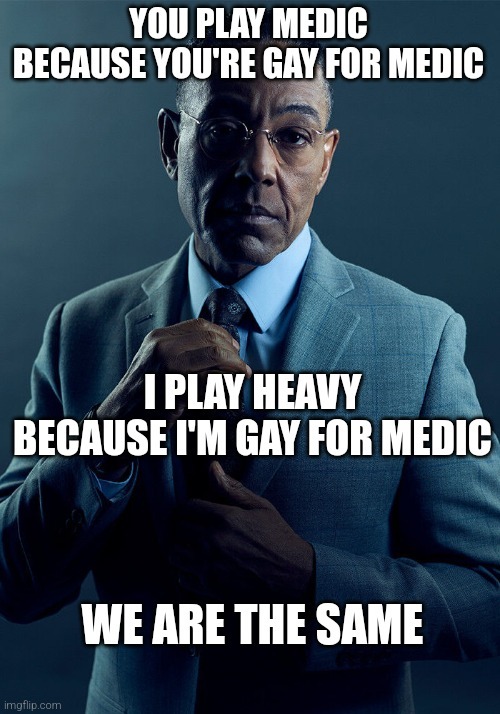
This came to me in an early morning queer haze
Kissing my medics good morning (I am your husband heavy and I love you)
#tf2#team fortress 2#heavymedic#i know its super annoying for everyone when the sole medic on the team keeps pocketing heavies so as a heavy main i will say this.#to the medics in the chat: i dont expect you to pocket me and in fact you shouldn't. i suck. but! if you would it would be cool and gay and#and i will kiss you abd love you and give you yummy food and protect you like my life depends on it i will be your meat shield because you#are amazing incredible for picking medic despite the horrors. i will do everything in my power to help u. but don't pocket me i suck#i meant for that to be more meaningful and like giving advice but it got gay. but i meant all of it#when i see a medic healing me i immediately switch to shield mode my life is no longer mine i exist to protect the beautiful man behind me#thank you medics👍🏽 if u play medic i hope you have a wonderful day today everyday 👍🏽👍🏽👍🏽❤️❤️#edit: i am gayer for heavy than i am for medic- but since i main heavy i am automatically attracted to medic and so this shitpost was born#so many people that play medic are apparently gay for heavy...... i feel so seen and understood
706 notes
·
View notes
Text

SKREEEECH.png has entered the chat
#ok my back hurts and there are. so many practice/study skreech & co. sketches currently on my hard drive.#it's been like two days since I started HOW did this happen</3 anyway#bright side! I now feel like I have a marginally better grasp of blending brushes as a concept?#dark side: he still Haunts me. and will continue to do so I imagine so there will likely be more unfinished SKREECH.pngs in the near future#(also: the squibbles over his head say motherfucker. naturally)#click for resolution blah blah bc apparently we still cannot upload in full quality in the year of our lord 2024.#max draws#max.txt#bucky barnes
90 notes
·
View notes
Text
The way Azirphale is underestimated and practically infantalized by heaven is so closely tied to his femininity and I think we should talk about it more because I just want to shout about how relatable the way he's treated in his workplace is as a woman working in a traditionally male field
It's in all the little niggling comments from your boss about personal things that hold no bearing on your work
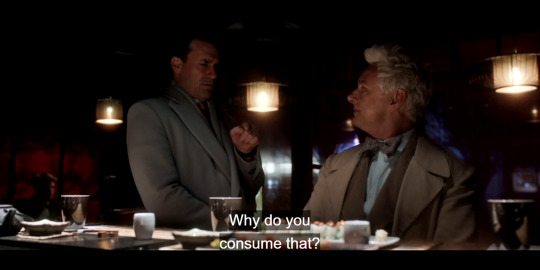
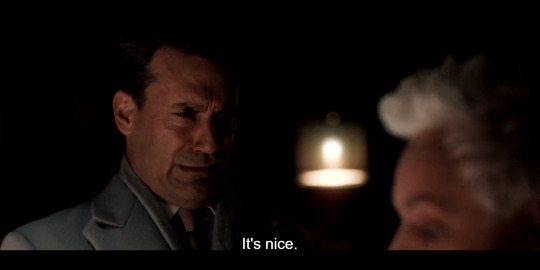
and the assumption that what you're doing must be simple if it was assigned to you
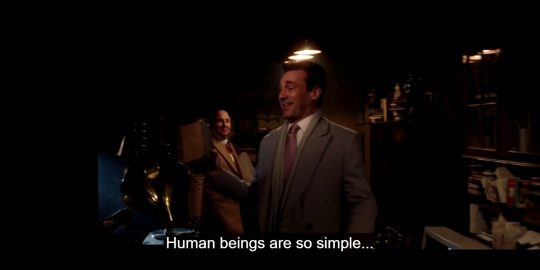

your work is trivialized
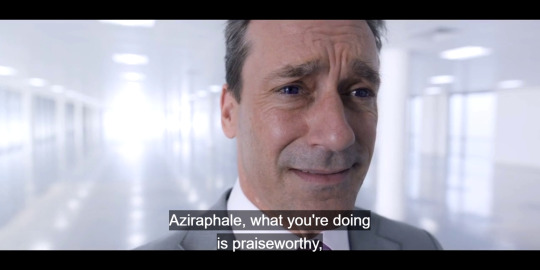

and you get these the placating smiles when you're told plans and proposals are rejected and passed over
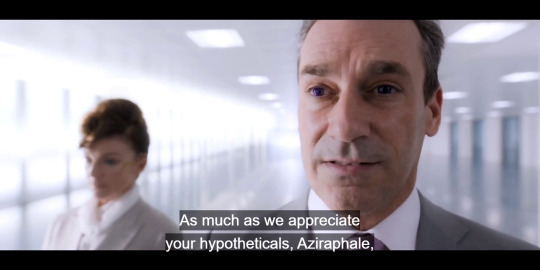
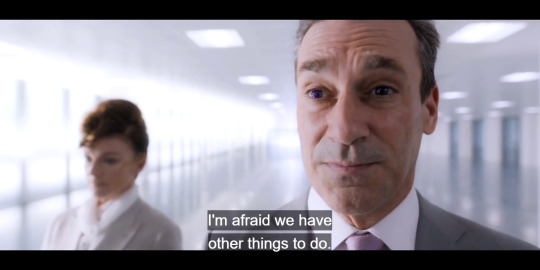

or when your complaints are dismissed


and you get more of the same from upper management
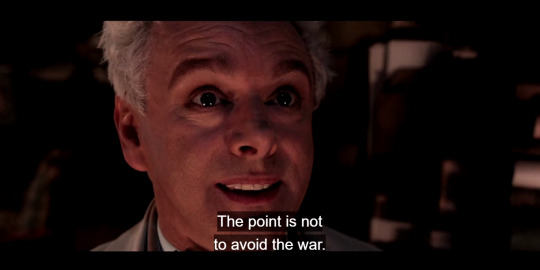
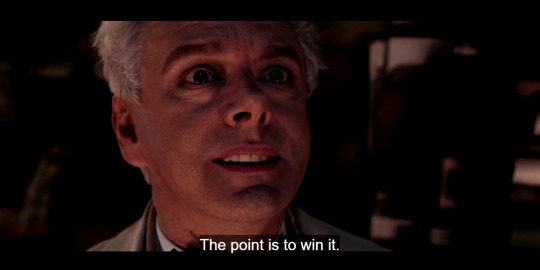
it all feels so frustrating and draining but you're at work so all you can do is take a breathe put on that mask and move on with your day
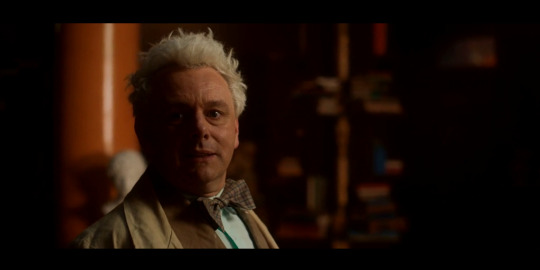
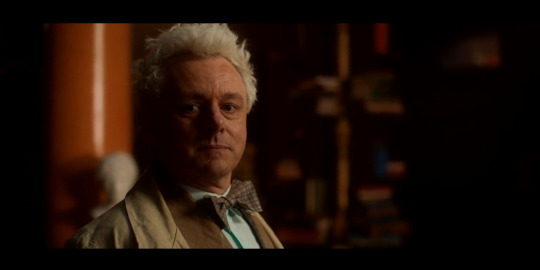
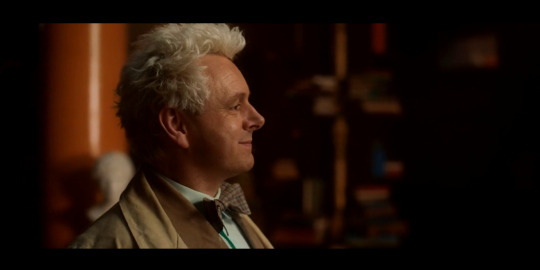
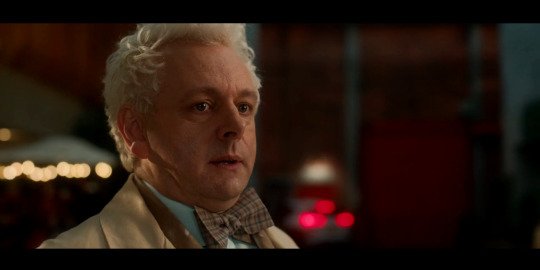

It is all so deteimental to your emotional well being and textually, so much of this is tied to Aziraphale's softness, his gayness - his femininity
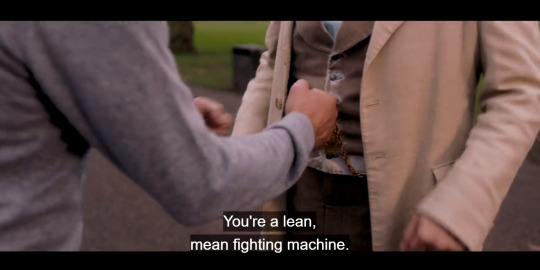
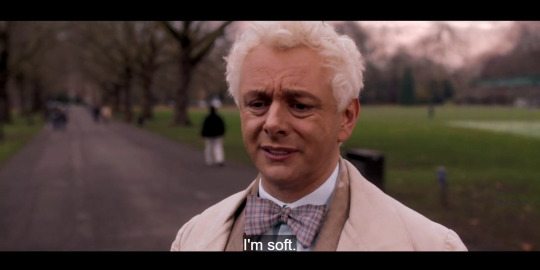
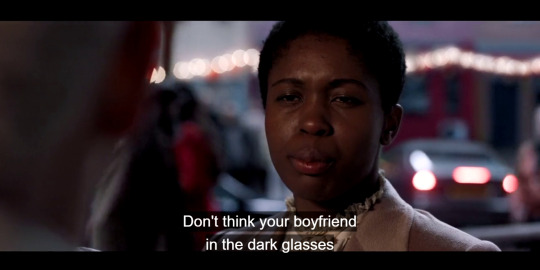
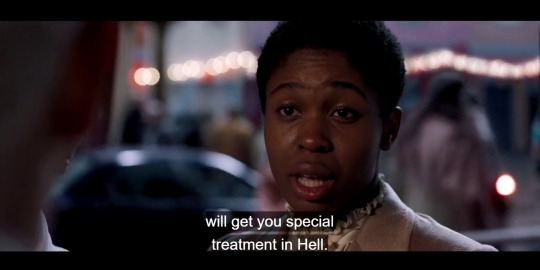
The thing about working in an environment and gives you this feeling - of being simultaneously destrought watching your belief in yourself get chipped away but also just so irate becuase you know you don't deserve it - is how it builds. It sinks under your skin and feeds into this indignant dejection until you can have a moment of release - but Azirphale doesn't get to bitch about it over drinks with friends, he doesn't get a lunch break where he can go for a walk and listen to an angry scandi death metal playlist, he doesn't even get the chance to cry about it in the bathroom for 5 minutes before confronting it again
(And I talked a little bit about it in the tags of this beautiful photoset but this all comes into play whenever Crowley dismisses his plans or calls him an idiot. These are purely emotional reactions; I really don't think Crowley means much by it - he respects Aziraphale's opinion and genuinely thinks he's brilliant - but Crowley is so quick to use this terminology when Aziraphale is making a decision Crowley thinks is wrong and he doesn't know how much this hurts Aziraphale. Just like Aziraphale doesn't understand the true impact the Fall had on Crowley, Crowley doesn't understand the ways heaven has been tearing away at Aziraphale's self worth)
Aziraphale has been facing this constant drip of denigration since before the beginning of time and has never released the pressure valve. At this point, he's a bomb waiting to go off
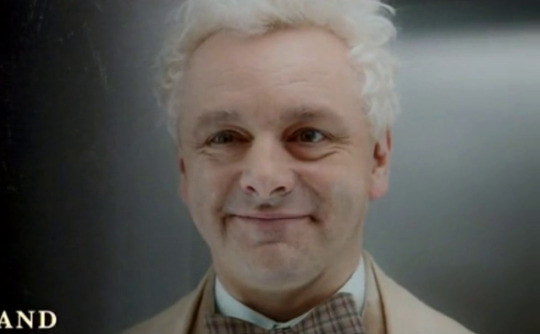
#(I want to note that I am coming at this from my personal experience as a woman#but I know femme neurodivergent and disabled folks of all genders face these same issues)#along similar lines I have tons of feelings about how often Aziraphale hides his hands when talking to other angels#to hide his stimming#and look I try not to tie everything back to explaning why Aziraphale ended s2 the way he did but apparently I can't#its just the juiciest character moment to me#also thinking about how angry Crowley was at Gabriel when he was treated like this once#granted shut up and die already IS the worst thing Gabriel has said to Aziraphale but if Crowley knew how much of this was going on...#aziraphale#good omens#go2 spoilers#good omens meta#Thanks to folks who responded to my tags on that post because you really motivated me to find these screen caps#and finish this post which has been sitting in my drafts for ages#also sorry so many of gabriels faces are funny I cant help that jon hamm is comedy gold - i refuse to let it undermine my point
1K notes
·
View notes
Text
The Hitler and KKK jokes were never funny tbh
#Like Reed I was with you until then lmao#This is like the craziest virtue signalling fandom ever#Idk why some can’t just call it what it is — classism and elitism#Why must you bring real life problems that have nothing to do with anything into this#In such a trivial and un-constructive way#You’re bloating the conversation so many people seemed like they were desperate to have considering many hate Cait because ‘ACAB’#Which. respect. but then there’s no substance behind any of that. People are just reiterating very progressive and leftist talking points#spearheaded by Black people (specifically Black women) that many people like to talk over may I add!!!#without any thought behind it. Liking or disliking a character should not be your daily dose of activism#again bloating a conversation with the hyper focus on an individual instead of the big picture of the narrative#and actively ignore the presentation of other characters of colour#ok I might as well just add my tags to a reblog lmao#but yeah idk I feel like people are just lying to my face about their leftism as they make kukluxkiramman and caitler jokes#youre not being funny or clever or really much at all. You’re just saying things out loud#Also super hypocritical since a solid (deffffff not all) of the fandom treat Mel so poorly#Ok I’m done#slay on the run#arcane#caitlyn#caitlyn kiramman#caitlyn arcane#this isn’t even a Caitlyn defence post lmao people are just annoying me#ALSO most of these jokes have been off Tumblr. I’ve blocked so many people I don’t see many of these but they’re apparently popular on twt
70 notes
·
View notes
Text


@wickjump you will never not be an absolute genius
#UTDR#UTMV#Wickjump#I just need these tags I have to keep them#I wanna print them and put them on my wall#This is everything to me#He just instantly becomes that like ''I'm the only one who does any work around here!!''#But if you try to help he's like ''but that's mine :< that's my job I do that :c''#Nightmare is gonna have to invest in so many star stickers#Do you think they have one of those star charts for Cross to put them on?#And the others have like. maybe 1 or 2 stars and Cross has like 45#But still refuses to believe he has earned anything around here#And him being mildly terrified of Horror#He's got that Jason Voorhees intimidating aura lol#I love Killer being like finally I don't have to do dishes! and then immediately trying to distract the guy who does dishes#Nightmare must think he hates having plates or something#No he just can't see Cross and leave him alone apparently#Also I feel like this adds a new layer to the saga of ''why are you always in Cross's bed''#Because I can imagine one time Killer invited Cross to sleep in his bed instead#But Cross took one look at the clothes all over his floor and junk everywhere and was like ''I have to leave right now immediately'' lol#Anyway I love reading your tags and posts so much they make my day <3
65 notes
·
View notes
Text
Rest
Guess what? I've got more Jamil x reader for y'all. You can also find this on ao3. No warnings, just 866 words of kinda fluffy(?) caretaking stuff with gender-neutral reader.
At this point, you know Jamil’s schedule almost as well as he does. So, when you have the chance, you head to Scarabia’s kitchen, hoping to spend some time with Jamil while he and the other students prepare dinner.
However, when you enter, it takes you but a moment to notice Jamil’s uncharacteristic fumbling and the tired look in his eyes. The way Jamil’s chopping the vegetables has you worried about him cutting himself with that knife he’s usually so adept with, and it seems it’s only force of habit that’s keeping him on track.
You frown, and when your eyes meet Jamil’s, you can already see him put his guard up.
So he knows what state he is in, huh? And still, here he is.
It seems Jamil is reading your thoughts, all of him telling you drop it before any words are even said.
At least he still lets you lean in and give a quick kiss to his cheek in greeting.
“Hello love. Do you still have a lot on your agenda for today?” you ask, keeping your tone low for at least some semblance of privacy in the busy kitchen.
“Nothing I can’t handle,” is the response you get.
Of course.
It takes a little more pestering before Jamil actually answers your question. Your lips purse. That list is far too long to your liking.
You take a moment to think, juggling your own plans and to-do list against the urgency of the things Jamil mentioned.
“Will Kalim be eating from that?” you ask, pointing at the food Jamil is preparing.
“Yes.”
“Alright, I won’t be touching that one, then. I’ve gotta do a few things but I’ll be back when you’re done here.”
“Don’t,” Jamil says with a glare, clearly aware of what you’re thinking.
Yet even his disapproving look doesn’t have the usual weight behind it.
“Yes. I will,” you say firmly, even as your heart curls inwards with another bout of concern.
Really, when did he get so tired?
And how did you not notice it earlier?
You leave the kitchen before Jamil can protest further, hurrying through the dorm corridors to find Kalim.
Soon you have an enthusiastic – and concerned – supporter for your plans. You have Kalim point out a few reliable Scarabia students to help with a few of the most urgent matters Jamil mentioned – cleaning up the common areas, delivering some paperwork to Crowley, preparing some dorm-wide notices – while you see to Kalim getting his school supplies in order for the following day. You even recruit a couple of third years to help Kalim with his homework.
You’ll see to the rest tomorrow – after all, you do also have a boyfriend to look after.
Your conversation over dinner can hardly be called anything else than an argument – despite Kalim’s best attempts at acting as a moderating force between you two. It is very tempting to ask Kalim to tell Jamil to take the rest of the day off – it’s not like Jamil would be willing to openly disobey a direct order. Still, you really don’t need to remind Jamil of his position on top of everything else that you’re already doing more or less against his wishes.
Eventually, however, Jamil’s had a square meal, the most urgent things on his to-do list are being taken care of, and you’ve managed to drag him to his bed.
“I really wish you wouldn’t push yourself so hard,” you murmur, your arms wrapped tightly around Jamil. You’re telling yourself you really do just want to cuddle, to offer some respite to Jamil. Still, there might also be a part of you worried that if you were to let go, he’d just jump up and get back to working himself to the bone.
Yet, for all his protestations, just the fact that you’ve gotten Jamil to lay down with you speaks volumes of his current exhaustion.
“I can’t just leave my duties, albi. You know this.”
“Making yourself too indispensable, is what you’re doing,” you protest.
Oh, you know it’s not so simple. Not with his background, not with all the expectations and assumptions.
But sometimes you really wish it would be.
Jamil merely scoffs in response to your words.
Still, it is undeniable that he is slowly beginning to relax in your arms, slowly bringing his head closer to yours. His eyes are starting to flutter, too.
“I will still need to help Kalim with his homework, at the very least.”
You wonder who he is trying to convince more, you or himself.
“Amin and Khalil are helping him. They’re basically top of their classes, aren’t they? I’m sure they’ve got it.”
Still, Jamil frowns.
You sigh. He really is not letting go, is he?
“Do you want me to go supervise?” you ask.
And leave you, unsaid yet hanging there right after your words.
“Don’t,” Jamil eventually says, the word barely more than a breath.
It seems he has accepted his fate.
You softly caress Jamil’s hair, listening to his softening breathing.
And when you wake up, wholly unaware of having been lulled to sleep in the first place, it’s to the lightest of touches from Jamil’s fingers.
Tagging @diodellet @twstgo @crystallizsch @jamilvapologist @jamilsimpno69 as per request If you'd like to be tagged for any future works, let me know!
#twisted wonderland#jamil viper#twisted wonderland x reader#jamil viper x reader#woop it sure has been quite the burst of creative energy lately#especially since this has apparently been sitting in my drafts since last august#but now you have it#I certainly can’t promise to keep up with this rate of writing (in fact I can promise I won't) but hey let's enjoy it while it lasts#and yes I’m hopping on the “jamil using arabic terms of endearment” train#I’ve read so many fics doing that that at this point it feels more natural than english ngl#even if english would probably be more canonical#also is it a *good* way to go about it to just pretty much just force someone to rest like this? probably not#is it sometimes the only way to get stubborn people to stop for a bit? perhaps#and is it something I might do?#...possibly#also oh boy can you tell that I'm avoiding jamil's dialogue like the plague lately?#I really need to reread so much of his stuff to get a hang of his voice again#(also if you notice typos pls tell me because they always bug me)#(or other wonkiness because I'm not a native speaker and sometimes things just go silly)#anyways hope y'all enjoy!
178 notes
·
View notes
Text
Fanfiction is so goated actually
No monetary incentive, just writing in one's free time. Some incentive for like kudos and comments, because who doesn't want to hear that someone else enjoyed what they wrote. Just writing a story that is good and/or enjoyable, no real-life pressure to keep it going because god forbid you and other people are depending on it financially.
Writing a story because you want to write a good story, so you can write what they want the way you want, at a pace that is realistic for you, with exactly the plot pacing you want there to be.
#c*rny posts#thinking about this after the my h*ro academia leaks lmao#i have read barely a few chapters of the manga and then kept up with it through tumblr osmosis#i was interested in how its gonna end#and after reading the leaks i was like 'well its up to the fanfic writers to write a good ending now'#cause. it was kind of underwhelming. like some stuff made sense and some things were just done badly#which is realistic considering h*rikoshi is apparently burned out to hell#and i was thinking. man. if i had to write AND illustrate a story for like ten years straight. because its my bread and butter#and there are other people depending on the story doing well to make money#it would 100% get to me. i would rather end it all lmao#which is why i think fanfic is so great#just writing a story that you want. that makes sense to you. that has elements you want. that is exactly as long as you want.#and there isnt even a possibility of really monetizing it so there is no drive to make is 'succeed' or make it as long as possible#this could be applied to just writing a 'regular' story also that is not intended for publishing#also kinda makes me think about h*ikyuu#i kinda do feel the timeskip and the ending were a bit rushed#but like. if it was me. i would have rushed it too lmao#after so many years of working on one thing and one thing only i would have been so done. just so done#and h*ikyuu ending to me wasnt even bad. it was good with good resolution of everything. with characters evolving and achieving their dreams#not necessarily volleyball related (like tenma)#the progress made realistic sense#but it did feel a bit rushed#anyway#fanfic and writing for yourself is great#and manga authors face way too much pressure from people dependent on them. from fans. even from society in general
117 notes
·
View notes
Text
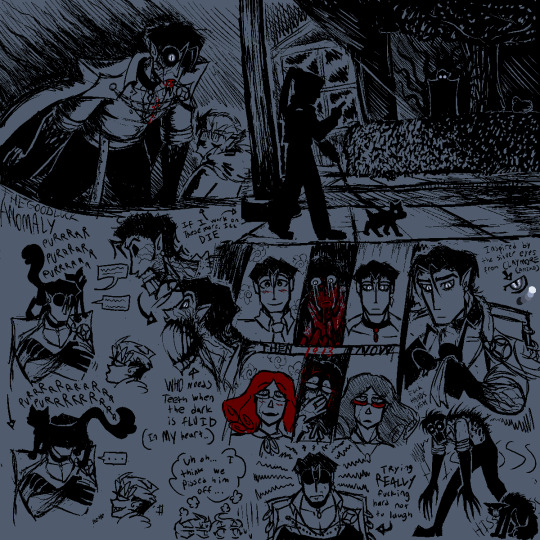
OH ARTHUR BENNETT.. such a gorgeous and intriguing character. terribly burdened by a GRUESOME set of crimes, his light suffocated by a HEAVY century of GUILT. so tragic, so dark and broody, and yet PAINFULLY awkward in any social setting ever
#jrwi fanart#cw blood#jrwi show#jrwi suckening#arthur bennett#OUHH THIS ONE WAS SITTING IN MY WIPS FOR SO LOOOONGwhen i took it out there was mould on it :sob:#BUT i think i was able to fix it up okay#i keep seeing SO MANY MISTAKES RRAAAHHH BUT YOU DONT SEE THEM RIGHT?? THATS ONLY ME. RIGHT?? EXACTLY.#THE KEY IS TO SAY. AND REPEAT AFTER ME. 'FUUUCK IT WE BALL#so anyway. arthur bennett huh? grizzly says that arthur is reaal fuckin difficult to play. and i SUPER get that. i mean LOOK AT HIM..#grizz often needs a minute to think abt what hes gonna say in a way that matches w that Stoic Personality. which is FAIR but also that#ends up making way for awkward confrontations like: the lady in the parky lot. he took too long to answer and scared her away.& I LOVE THAT#arthur is tragic and sad and cool and stoic but hes ALSO awkward and silly and kinda dumb and short sighted. HE HAS COMPLEXITIES#I LOVE WHEN TTRPG CHARACTERS HAVE A GOOD SET OF SHORTCOMINGS. ESPECIALLY WHEN U FIND THEM ONLY AS U PLAY THEM.#I COULd go on and on saying the same things w different words abt arthurs intriguing and entertaining character but i shall spare u. for no#ILL ALSO MENTION HOW MUCH I LOVE HIS FLAVOR THO.. I LOVE TALL HOT BOY WHOS ONE W THE DARKNESS.. I REMEMBER WHEN HE FIRST MENTIONED THE#BADLUCK. N I WAS LIKE OOOHH THATS WHY HIS DESIGN IS SO COOL N CHAOTIC N ASYMMETRICAL. HES UNLUCKY!!! i love love love his design so much...#GRaaauruguguraguhhghghgh what else what else is there for me to spew on abt...i think im reachin a limit here..OH MAGNUS. i hope that#we get to know more abt how magnus and arthur met.. like How they became besties... ouuhh... I ALSO WANNA KNOW MORE ABT MARY DAVIS. LIKEHOW#he also apparently spent alotta time in a zone dominated by edward twilight? all he remembers is constant partying? I WANNA KNOW MORE..#i think i got room 4 one more ramble SO. THE ART PIECE.as i said its gone a lil stale BUT. im still very proud o the bits where hes allScar#I WANNA SEE HIM GET SCARYMORE. I like the idea of shadows solidifying to make him strange and eerie.like TEETH n CLAWS n SPINES n YESS#also the SILVER EYES.no1 does silver eyes like the show Claymore. they make em look so striking and eerie...i also like to think that#human arthur had deep beautiful brown eyes.just in my beaitufl heart.i mean look at him..i wanna cook him n eat him.ANYWAY#i think thats all my ramblin for this piece. now i gotta go cancel a single day i had ata hotel bc my work schedule change last minute FUCK#feel free to ramble in my tags aswell tho i read all of them and i chew on thenm and i love them so sos os mcuh
149 notes
·
View notes
Text
Thats it this post is an @kathaynesart appreciation post. Comment or reblog if you love and appreciate Kat and her work <3
#if wren got an appreciation post so does kat#ive been wanting to do one for kat forever now but I keep getting shy#apparently im feeling brave today <3#because we mutually agree future leos death scene is the best movie scene#but genuinely?#kat you have no idea how amazing it is for MANY people to get nice comments from you#You are a huge source of inspiration for everyone#Many people look up to you and the fact you look up at people in return?#How you interact and support everyone?#we love you#the wraenata but of post comments <3#I still have no clue if you are making a reblog sideblog but if you do or not im still stoked to remain around supporting everyone anyways#<3#have an appreciation post you deserve it#hope im not posting too late for people to see this haha
435 notes
·
View notes